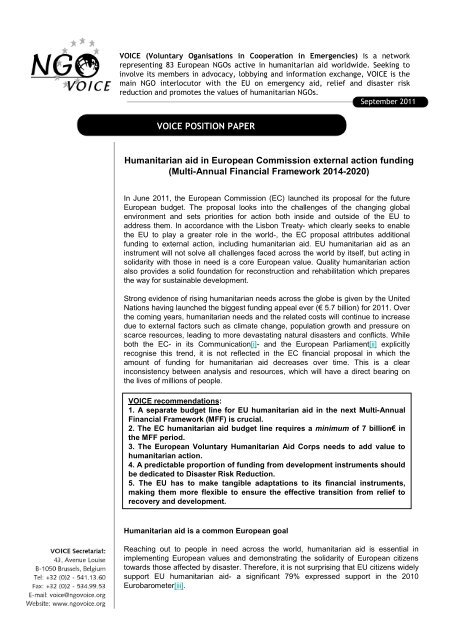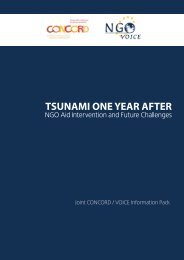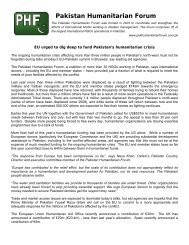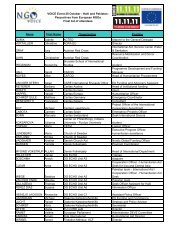VOICE position paper Humanitarian aid in European Commission
VOICE position paper Humanitarian aid in European Commission
VOICE position paper Humanitarian aid in European Commission
Create successful ePaper yourself
Turn your PDF publications into a flip-book with our unique Google optimized e-Paper software.
<strong>VOICE</strong> (Voluntary Oganisations <strong>in</strong> Cooperation <strong>in</strong> Emergencies) is a network<br />
represent<strong>in</strong>g 83 <strong>European</strong> NGOs active <strong>in</strong> humanitarian <strong>aid</strong> worldwide. Seek<strong>in</strong>g to<br />
<strong>in</strong>volve its members <strong>in</strong> advocacy, lobby<strong>in</strong>g and <strong>in</strong>formation exchange, <strong>VOICE</strong> is the<br />
ma<strong>in</strong> NGO <strong>in</strong>terlocutor with the EU on emergency <strong>aid</strong>, relief and disaster risk<br />
reduction and promotes the values of humanitarian NGOs.<br />
September 2011<br />
<strong>VOICE</strong> POSITION PAPER<br />
<strong>Humanitarian</strong> <strong>aid</strong> <strong>in</strong> <strong>European</strong> <strong>Commission</strong> external action fund<strong>in</strong>g<br />
(Multi-Annual F<strong>in</strong>ancial Framework 2014-2020)<br />
In June 2011, the <strong>European</strong> <strong>Commission</strong> (EC) launched its proposal for the future<br />
<strong>European</strong> budget. The proposal looks <strong>in</strong>to the challenges of the chang<strong>in</strong>g global<br />
environment and sets priorities for action both <strong>in</strong>side and outside of the EU to<br />
address them. In accordance with the Lisbon Treaty- which clearly seeks to enable<br />
the EU to play a greater role <strong>in</strong> the world-, the EC proposal attributes additional<br />
fund<strong>in</strong>g to external action, <strong>in</strong>clud<strong>in</strong>g humanitarian <strong>aid</strong>. EU humanitarian <strong>aid</strong> as an<br />
<strong>in</strong>strument will not solve all challenges faced across the world by itself, but act<strong>in</strong>g <strong>in</strong><br />
solidarity with those <strong>in</strong> need is a core <strong>European</strong> value. Quality humanitarian action<br />
also provides a solid foundation for reconstruction and rehabilitation which prepares<br />
the way for susta<strong>in</strong>able development.<br />
Strong evidence of ris<strong>in</strong>g humanitarian needs across the globe is given by the United<br />
Nations hav<strong>in</strong>g launched the biggest fund<strong>in</strong>g appeal ever (€ 5.7 billion) for 2011. Over<br />
the com<strong>in</strong>g years, humanitarian needs and the related costs will cont<strong>in</strong>ue to <strong>in</strong>crease<br />
due to external factors such as climate change, population growth and pressure on<br />
scarce resources, lead<strong>in</strong>g to more devastat<strong>in</strong>g natural disasters and conflicts. While<br />
both the EC- <strong>in</strong> its Communication[i]- and the <strong>European</strong> Parliament[ii] explicitly<br />
recognise this trend, it is not reflected <strong>in</strong> the EC f<strong>in</strong>ancial proposal <strong>in</strong> which the<br />
amount of fund<strong>in</strong>g for humanitarian <strong>aid</strong> decreases over time. This is a clear<br />
<strong>in</strong>consistency between analysis and resources, which will have a direct bear<strong>in</strong>g on<br />
the lives of millions of people.<br />
<strong>VOICE</strong> recommendations:<br />
1. A separate budget l<strong>in</strong>e for EU humanitarian <strong>aid</strong> <strong>in</strong> the next Multi-Annual<br />
F<strong>in</strong>ancial Framework (MFF) is crucial.<br />
2. The EC humanitarian <strong>aid</strong> budget l<strong>in</strong>e requires a m<strong>in</strong>imum of 7 billion€ <strong>in</strong><br />
the MFF period.<br />
3. The <strong>European</strong> Voluntary <strong>Humanitarian</strong> Aid Corps needs to add value to<br />
humanitarian action.<br />
4. A predictable proportion of fund<strong>in</strong>g from development <strong>in</strong>struments should<br />
be dedicated to Disaster Risk Reduction.<br />
5. The EU has to make tangible adaptations to its f<strong>in</strong>ancial <strong>in</strong>struments,<br />
mak<strong>in</strong>g them more flexible to ensure the effective transition from relief to<br />
recovery and development.<br />
<strong>Humanitarian</strong> <strong>aid</strong> is a common <strong>European</strong> goal<br />
Reach<strong>in</strong>g out to people <strong>in</strong> need across the world, humanitarian <strong>aid</strong> is essential <strong>in</strong><br />
implement<strong>in</strong>g <strong>European</strong> values and demonstrat<strong>in</strong>g the solidarity of <strong>European</strong> citizens<br />
towards those affected by disaster. Therefore, it is not surpris<strong>in</strong>g that EU citizens widely<br />
support EU humanitarian <strong>aid</strong>- a significant 79% expressed support <strong>in</strong> the 2010<br />
Eurobarometer[iii].
In addition, provid<strong>in</strong>g rapid, needs-based support to vulnerable populations follow<strong>in</strong>g man-made<br />
and natural disasters is a strategic objective of the EU, <strong>in</strong> l<strong>in</strong>e with the EU 2020 strategy. This is<br />
confirmed <strong>in</strong> the Lisbon Treaty, which conta<strong>in</strong>s a specific legal basis for EU <strong>Humanitarian</strong> Aid.<br />
Moreover, <strong>in</strong> the <strong>European</strong> Consensus on <strong>Humanitarian</strong> Aid[iv], the member states, the<br />
<strong>European</strong> Parliament and the EC have agreed upon common values, pr<strong>in</strong>ciples and objectives of<br />
EU humanitarian <strong>aid</strong>. They reiterated that humanitarian <strong>aid</strong> is a shared competence between<br />
them, which builds upon a long tradition.<br />
The added value of <strong>European</strong> <strong>Commission</strong> humanitarian <strong>aid</strong><br />
<strong>European</strong> <strong>Commission</strong> (EC) humanitarian <strong>aid</strong> money is efficiently spent, as confirmed <strong>in</strong> the<br />
assessment by the <strong>European</strong> Court of Auditors, and accountably spent through direct fund<strong>in</strong>g to<br />
a diversity of professional humanitarian civilian actors (NGOs, Red Cross, United Nations).<br />
These humanitarian actors manage to reach a wide variety of affected populations <strong>in</strong> conflict<br />
situations and natural disasters. Their long term <strong>in</strong>volvement is crucial for ensur<strong>in</strong>g a<br />
professional, far-reach<strong>in</strong>g response to humanitarian crises.<br />
The solid field expertise of the EC’s humanitarian and civil protection <strong>aid</strong> department (DG ECHO)<br />
(112 experts and 315 local staff <strong>in</strong> the field) comb<strong>in</strong>ed with the professional implementation by<br />
the partners mentioned above, contribute to quality delivery of <strong>aid</strong> and better target<strong>in</strong>g of disaster<br />
affected populations. Recent <strong>in</strong>dependent evaluations confirm that the EC is a quality donor.<br />
DARA (Development Assistance Research Associates) ranks ECHO 6th of 23 OECD donors,<br />
while the UK Department for International Development states that “Programm<strong>in</strong>g, peer reviews,<br />
plann<strong>in</strong>g, procurement, <strong>in</strong>dependent implementation monitor<strong>in</strong>g and evaluation are standard<br />
across the EC and allow the EC to make efficiency sav<strong>in</strong>gs”.[v]<br />
In 2010, 140 million people have benefited directly and <strong>in</strong>directly from EC humanitarian <strong>aid</strong>[vi].<br />
The EC structures for humanitarian <strong>aid</strong> enable the EC to respond <strong>in</strong> a timely and effective way to<br />
sudden disasters, show<strong>in</strong>g flexibility <strong>in</strong> allocations and means of response. Moreover, EC<br />
humanitarian <strong>aid</strong> ma<strong>in</strong>ta<strong>in</strong>s a unique balance between address<strong>in</strong>g sudden emergencies and<br />
forgotten, long term crises. The reason is that EC humanitarian <strong>aid</strong> is based on professional<br />
humanitarian needs assessments, look<strong>in</strong>g solely at needs of affected populations with the aim of<br />
sav<strong>in</strong>g lives and reduc<strong>in</strong>g suffer<strong>in</strong>g. Due to its special focus and way of work<strong>in</strong>g, ECHO fund<strong>in</strong>g<br />
is essential to complement member states’ fund<strong>in</strong>g. This coord<strong>in</strong>ated EU approach enables<br />
implement<strong>in</strong>g partners to reach a far greater number of disaster affected populations, cover<strong>in</strong>g<br />
forgotten crises as well as those <strong>in</strong> the media spotlight.<br />
Collectively, the EU (EC and member states) accounts for about 40% of the world’s humanitarian<br />
<strong>aid</strong>[vii]. Due to its scale and com<strong>position</strong>, the EU can mobilise an adequate amount of money and<br />
respond to disasters <strong>in</strong> a coord<strong>in</strong>ated and comprehensive way. In addition, as the biggest<br />
humanitarian donor, the EU can <strong>in</strong>fluence the <strong>in</strong>ternational humanitarian agenda and multiply<br />
good donorship practices.<br />
FUTURE FUNDING FOR EU HUMANITARIAN AID: RECOMMENDATIONS<br />
1. A separate budget l<strong>in</strong>e for EU humanitarian <strong>aid</strong> <strong>in</strong> the next Multi-Annual F<strong>in</strong>ancial<br />
Framework (MFF) is crucial <strong>in</strong> order to enable humanitarian decision mak<strong>in</strong>g at EC level to<br />
rema<strong>in</strong> <strong>in</strong>dependent from security and geopolitical <strong>in</strong>terests. This is necessary to uphold the<br />
humanitarian pr<strong>in</strong>ciples of humanity, impartiality, neutrality, and <strong>in</strong>dependence, which were<br />
agreed upon <strong>in</strong> the <strong>European</strong> Consensus on <strong>Humanitarian</strong> Aid as the fundamental basis for EU<br />
humanitarian <strong>aid</strong>. “This pr<strong>in</strong>cipled approach is essential to the acceptance and ability of the EU,<br />
and humanitarian actors <strong>in</strong> general, to operate on the ground <strong>in</strong> often complex political and<br />
security contexts” (art.10 Consensus). It is fundamental for the security of implement<strong>in</strong>g partners<br />
and affected populations that humanitarian <strong>aid</strong> is perceived as <strong>in</strong>dependent <strong>in</strong> the field.
2. The EC humanitarian <strong>aid</strong> budget l<strong>in</strong>e requires a m<strong>in</strong>imum of 7 billion€ <strong>in</strong> the MFF<br />
period. In 2010, 1.1 billion€ was needed and efficiently spent by the EC through its partners.<br />
However, for the last few years DG ECHO consistently had to use budgetary re<strong>in</strong>forcements<br />
(the Emergency Aid Reserve, EAR) to be able to meet humanitarian needs, demonstrat<strong>in</strong>g a<br />
consistent fund<strong>in</strong>g shortage- also recognised by the <strong>European</strong> Parliament. Also the transfer of<br />
fund<strong>in</strong>g from the <strong>European</strong> Development Fund (on average 30 million€ per year) proved to be<br />
important. In addition to an overall <strong>in</strong>crease <strong>in</strong> fund<strong>in</strong>g, given that humanitarian needs are<br />
expected to <strong>in</strong>crease, the level of fund<strong>in</strong>g should go up dur<strong>in</strong>g the MFF period and priority<br />
access for humanitarian <strong>aid</strong> to the EAR has to be ensured.<br />
3. The <strong>European</strong> Voluntary <strong>Humanitarian</strong> Aid Corps needs to add value to humanitarian<br />
action. As humanitarian needs cont<strong>in</strong>ue to rise and f<strong>in</strong>ancial times are difficult, <strong>VOICE</strong><br />
underl<strong>in</strong>es the need for regular evaluation of the Corps as it develops, mak<strong>in</strong>g sure it really<br />
represents the best use of scarce resources to provide EU assistance to crisis-affected<br />
populations.<br />
4. A predictable proportion of fund<strong>in</strong>g from development <strong>in</strong>struments should be<br />
dedicated to Disaster Risk Reduction (DRR). This proportion has to be l<strong>in</strong>ked to the level of<br />
risk. The EU should support preparedness of disaster prone populations, <strong>in</strong>clud<strong>in</strong>g build<strong>in</strong>g up<br />
their <strong>in</strong>stitutional capacity. Moreover, development <strong>in</strong>struments should be able to directly fund<br />
DRR <strong>in</strong>itiatives, especially those which address vulnerabilities at a grassroots level. Close<br />
coord<strong>in</strong>ation between humanitarian and development fund<strong>in</strong>g <strong>in</strong>struments is essential to ensure<br />
that the DRR experience of the humanitarian community is effectively carried through <strong>in</strong>to<br />
development programmes. This will not only lead to a better susta<strong>in</strong>ability of DRR activities<br />
undertaken by humanitarian actors and to poverty reduction, but it will also save money by<br />
mitigat<strong>in</strong>g future crises. The disasters <strong>in</strong> the Horn of Africa, Haiti and Pakistan pa<strong>in</strong>fully<br />
demonstrated the need for <strong>in</strong>vestment <strong>in</strong> DRR and widespread DRR ma<strong>in</strong>stream<strong>in</strong>g. DRR<br />
measures are needed before the event, not after, when the humanitarian crisis strikes and<br />
humanitarian fund<strong>in</strong>g becomes available.<br />
5. The EU has to make tangible adaptations to its f<strong>in</strong>ancial <strong>in</strong>struments, mak<strong>in</strong>g them<br />
more flexible to ensure the effective transition from relief to recovery and development<br />
phases. In order to enhance the impact of the EU’s action <strong>in</strong> the humanitarian field, the l<strong>in</strong>k<br />
between relief, rehabilitation and development (LRRD) should be ensured. However, under<br />
current <strong>in</strong>struments, EU f<strong>in</strong>ancial support to LRRD is <strong>in</strong>sufficient and <strong>in</strong>effective. There is a lack<br />
of follow-up of short-term fund<strong>in</strong>g cycles and a lack of flexibility <strong>in</strong> longer-term <strong>in</strong>struments. The<br />
next MFF must foresee reliable and flexible fund<strong>in</strong>g for LRRD <strong>in</strong> order to ensure that <strong>aid</strong> is more<br />
susta<strong>in</strong>able and adapted to local needs. A certa<strong>in</strong> percentage of development fund<strong>in</strong>g (country<br />
strategy <strong>paper</strong>s) should be reserved for LRRD (depend<strong>in</strong>g on the needs of the country<br />
concerned). In addition, the upcom<strong>in</strong>g revision of the F<strong>in</strong>ancial Regulation provides an<br />
opportunity to simplify the f<strong>in</strong>ancial rules for the adm<strong>in</strong>istration and implementation of EU<br />
fund<strong>in</strong>g. This could facilitate the allocation of LRRD fund<strong>in</strong>g and dim<strong>in</strong>ish the adm<strong>in</strong>istrative<br />
burden which EU regulations impose on implement<strong>in</strong>g partners.<br />
[i] EC Communication, 29 June 2011, http://ec.europa.eu/budget/library/biblio/documents/f<strong>in</strong>_fwk1420/MFF_COM-2011-<br />
500_Part_I_en.pdf<br />
[ii] <strong>European</strong> Parliament Resolution on the MFF, 8 June 2011,<br />
http://www.europarl.europa.eu/oeil/F<strong>in</strong>dByProcnum.dolang=2&procnum=INI/2010/2211.<br />
[iii] http://ec.europa.eu/public_op<strong>in</strong>ion/archives/ebs/ebs_343_en.pdf, p.38.<br />
[iv] http://eur-lex.europa.eu/LexUriServ/LexUriServ.douri=OJ:C:2008:025:0001:0012:EN:PDF<br />
[v] http://www.dfid.gov.uk/Documents/publications1/mar/multilateral_<strong>aid</strong>_review.pdf, p.179.<br />
[vi] Ibid.<br />
[vii] Speech <strong>Commission</strong>er Georgieva at Order of Malta conference, 27-28 January 2011.






